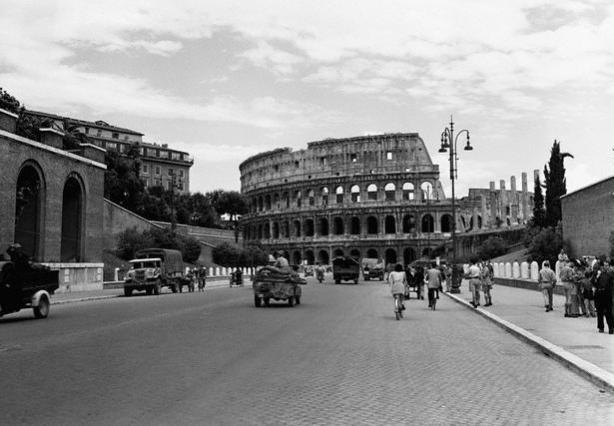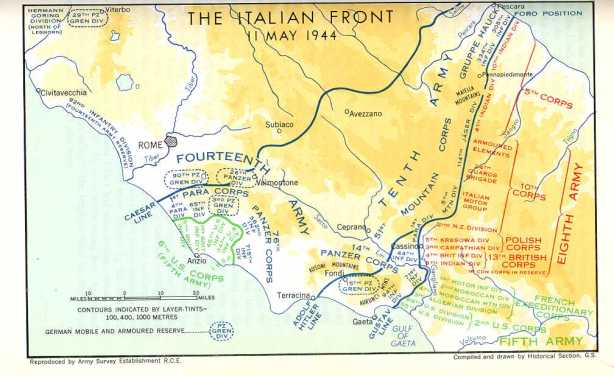THE WAR COMES TO ITALY
We pull out in the morning for the invasion of Sicily, I think it will be a pretty bloody show… I doubt that I will be killed or even wounded, but one can never tell. It is all a question of destiny.
General George S. Patton, letter to his wife Beatrice, July 9th, 1943
At a meeting in Casablanca, western Morocco, in January 1943, Churchill had persuaded Roosevelt that, after North Africa, they should attack the “soft underbelly” of Europe – Sicily. However, in an elaborate deception, a body in a Royal Marine uniform was dropped in the waters of Spain with papers suggesting the attacks would be on Sardinia. The Spanish handed the papers to the Germans, who were taken in by the ruse. Hitler ordered the strengthening of fortifications on Sardinia & Corsica. A panzer division was sent to Greece & two more withdrawn from the Soviet Union, immediately before the conflict at Kursk.
THE ALLIES IN SICILY
On July 10th, 1943, at 05:00 hours, Montgomery’s Eighth Army & General Patton’s Seventh Army landed on the southern shores of Sicily to find the island’s defenders were drawn up along the north shore, facing Sardinia. They knew an attack was coming. For a month, their defenses had been pounded by 4,000 Allied planes. In response, the defenders could put up just 200 Italian & 320 German planes, & much of the island’s infrastructure, including its airfields, had been wiped out. Even so, the landings were nearly a disaster. Axis aircraft had spotted the Allied fleet leaving Malta. The fleet was hit by a storm, nearly forcing it to turn back. In the heavy weather, the defenders dropped their guard, but high winds took their toll on the invading airborne troops, blowing its gliders & parachutists out to sea to their deaths. Those that landed on the island were widely dispersed. Nevertheless, they succeeded in harassing enemy movements, & 100 British airborne troops took a vital bridge on the coastal road & held it for five days until the Eighth Army arrived.

THE AMPHIBIOUS ASSAULT
At dawn on July 10th, the coastal defenses were pounded by tactical aircraft & naval gunfire. Then a fleet of 2,590 ships, including 237 troop transports & 1,742 landing craft, began putting ashore 115,000 British & Canadian troops, & 66,000 Americans. Facing them were the 230,000 men & 150 guns of the Italian Sixth Army & two panzer divisions. The Italian coastal force put up a heroic defense but was virtually wiped out. The following morning the Panzers ran into the forward posts of the First American Division, but they came under fire from six Allied destroyers & the cruisers Savannah & Boise, who knocked out 30 German tanks. The Italian “Livorno” Division was also badly mauled. Meanwhile, the British Eighth Army occupied the ports of Augusta & Syracuse in the southeast without a shot being fired, because their garrisons had already been evacuated. On July 14th, the airfields at Comiso & Ragusa in southern Sicily were taken & rapidly put back into commission.
PATTON & MONTGOMERY RACE FOR MESSINA
The Allied dash was then on for Messina, the crossing point to mainland Italy. Once Messina was taken, the enemy would be trapped on the island & forced to surrender, but Field Marshal Albert Kesselring, now the German commander in Italy, preempted them. He sent in another Panzer division & General Hans Hube took over command of all German fighting forces in Sicily.
Montgomery’s dash for Messina was stopped at Catania by stiff defense, halfway up the east coast. He then turned inland, switching his attack to the west of Mount Etna. But this move stepped on the Americans’ toes. Patton pushed westward & captured Sicily’s capital, Palermo, on July 22nd, 1943. He then began his own dash on Messina along the north coast. But Hube stopped him at the small town of Santo Stefano, halfway down the coastal road. Meanwhile, the First Canadian Division pushed northwest, confining German defenders to the northeast corner of the island. The British were now landing the 78th Division at Syracuse, while the American Ninth Division landed at Palermo. This increased the Allies’ strength to 11 divisions. Totally outnumbered, Hube pulled back.

MUSSOLINI’S DOWNFALL
 On the night of July 24th, Mussolini told the Grand Council of Fascists that the Germans were thinking of evacuating southern Italy. Hitler was clearly more interested in defending Germany than Italy &, after the reverses on the Eastern Front, some members of the Grand Council believed that his defeat was inevitable. Their priority was to prevent Italy from becoming a battleground. They voted against Mussolini, who was arrested & imprisoned at Campo Imperatore, high in the Abruzzi mountains. Meanwhile, the new Italian government, led by Marshal Pietro Badoglio, began secret peace talks with the Allies, while assuring the Germans that they were doing nothing of the sort. After the fall of Mussolini, Kesselring was ordered by Hitler to withdraw from Sicily. The Strait of Messina was bristling with anti-aircraft guns & Hube managed to get two-thirds of his force across to the Italian mainland before, at 08:30 hours on August 17th, 1943, the British & Americans met in the ruins of Messina, leaving just two miles of clear water between the Allied Army & the mainland. The invasion of Sicily cost 5,532 Allied dead, 14,410 cruisers damaged. The Italians lost 4,278 dead & the Germans 4,325. The Allies had taken 132,000 prisoners, along with 520 guns & 260 tanks.
On the night of July 24th, Mussolini told the Grand Council of Fascists that the Germans were thinking of evacuating southern Italy. Hitler was clearly more interested in defending Germany than Italy &, after the reverses on the Eastern Front, some members of the Grand Council believed that his defeat was inevitable. Their priority was to prevent Italy from becoming a battleground. They voted against Mussolini, who was arrested & imprisoned at Campo Imperatore, high in the Abruzzi mountains. Meanwhile, the new Italian government, led by Marshal Pietro Badoglio, began secret peace talks with the Allies, while assuring the Germans that they were doing nothing of the sort. After the fall of Mussolini, Kesselring was ordered by Hitler to withdraw from Sicily. The Strait of Messina was bristling with anti-aircraft guns & Hube managed to get two-thirds of his force across to the Italian mainland before, at 08:30 hours on August 17th, 1943, the British & Americans met in the ruins of Messina, leaving just two miles of clear water between the Allied Army & the mainland. The invasion of Sicily cost 5,532 Allied dead, 14,410 cruisers damaged. The Italians lost 4,278 dead & the Germans 4,325. The Allies had taken 132,000 prisoners, along with 520 guns & 260 tanks.
PATTON’S DEFENSE
 After winning the race for Messina, “Old Blood & Guts” Patton snatched disaster from the jaws of triumph. Visiting the Allied wounded, he slapped two shell-shocked enlisted men, accusing them of cowardice. The press was outraged, but Eisenhower refused to sack him, saying: “Patton is indispensable to the war effort – one of the guarantors of our victory.” However, Patton was forced to apologize & was ordered to remain behind in Palermo when the Allies invaded Italy. The final blow came when he heard that General Omar Bradley had been chosen to lead the US land forces in the invasion of Normandy.
After winning the race for Messina, “Old Blood & Guts” Patton snatched disaster from the jaws of triumph. Visiting the Allied wounded, he slapped two shell-shocked enlisted men, accusing them of cowardice. The press was outraged, but Eisenhower refused to sack him, saying: “Patton is indispensable to the war effort – one of the guarantors of our victory.” However, Patton was forced to apologize & was ordered to remain behind in Palermo when the Allies invaded Italy. The final blow came when he heard that General Omar Bradley had been chosen to lead the US land forces in the invasion of Normandy.
From The Story Of A World At War: World War II, by Nigel Cawthorne












